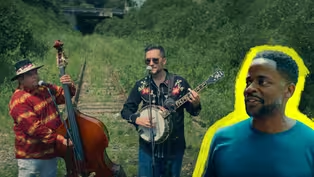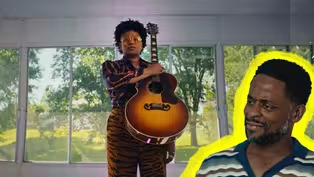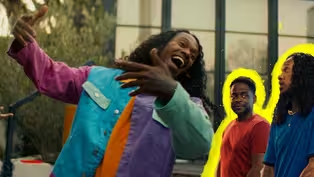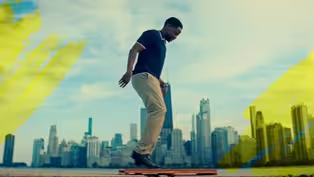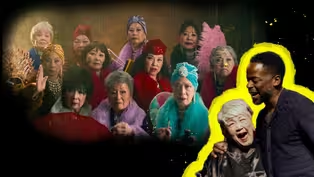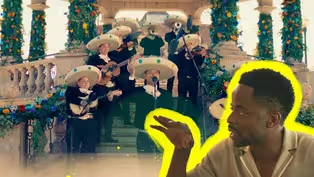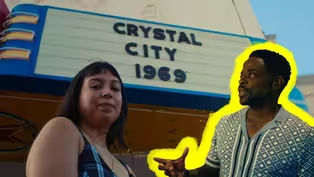
Fighting for Syrian Refugees with Soul Music
Special | 11m 32sVideo has Closed Captions
A Syrian-American musician brings awareness to the civil war in his family’s homeland.
Bassel Almadani is a Syrian-American musician who is using his platform to bring awareness to the civil war and refugee crisis in his family’s homeland. Off-stage, Bassel teaches refugee children to keep their culture alive through music.
Problems playing video? | Closed Captioning Feedback
Problems playing video? | Closed Captioning Feedback
This program was made possible by a grant from Anne Ray Foundation.

Fighting for Syrian Refugees with Soul Music
Special | 11m 32sVideo has Closed Captions
Bassel Almadani is a Syrian-American musician who is using his platform to bring awareness to the civil war and refugee crisis in his family’s homeland. Off-stage, Bassel teaches refugee children to keep their culture alive through music.
Problems playing video? | Closed Captioning Feedback
How to Watch The Express Way with Dulé Hill
The Express Way with Dulé Hill is available to stream on pbs.org and the free PBS App, available on iPhone, Apple TV, Android TV, Android smartphones, Amazon Fire TV, Amazon Fire Tablet, Roku, Samsung Smart TV, and Vizio.
Buy Now
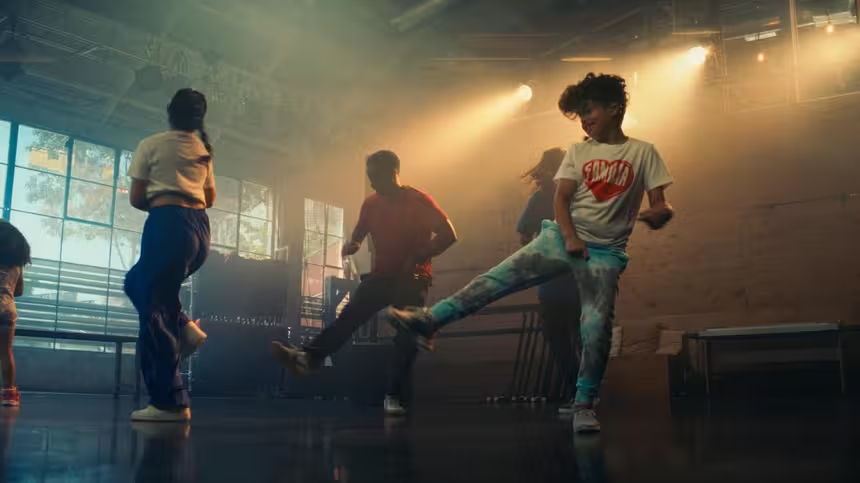
5 Artists Showcasing the Power of Art
From colorful cabarets and moving movies to artistic techniques that transcend the senses, here are five inspiring artists highlighted in The Express Way with Dulé Hill.Providing Support for PBS.org
Learn Moreabout PBS online sponsorshipMore from This Collection
This digital series follows Dulé Hill as he connects with diverse artists across America, exploring their history and letting us into their world on a deeper level.
Blending Latin Folk and Bluegrass Music
Video has Closed Captions
Larry & Joe are blending Latin folk and bluegrass music to show music has no borders. (16m 59s)
Finding Identity as a Black Appalachian Artist
Video has Closed Captions
Dulé Hill explores how music can provide solace and healing with musician Amythyst Kiah. (14m 51s)
Video has Closed Captions
Deaf dancer Shaheem Sanchez changes how Dulé Hill thinks about dance. (11m 42s)
Dulé Hill’s History of Tap Dance
Video has Closed Captions
Dulé Hill shares his motivation for mastering tap dance and carrying its legacy forward. (7m 45s)
Revitalizing Nightlife in San Francisco’s Chinatown
Video has Closed Captions
A multi-generational effort to preserve San Francisco Chinatown’s rich cultural history. (10m 3s)
Reimagining the Mariachi Charro Suit
Video has Closed Captions
Mariachi Arcoiris de Los Angeles reimagines the mariachi charro suit. (8m 36s)
Fighting for the Right to Speak Spanish
Video has Closed Captions
A new play tells the story of a Latino student walkout that changed history in Texas. (8m 13s)
Providing Support for PBS.org
Learn Moreabout PBS online sponsorshipDulé Hill: We often forget the power of art, the power of expression, and how we can use it to highlight awareness, to hopefully impact change, and that's especially important when the stakes for your community or your family's homeland are a matter of life or death.
Art is powerful.
[Train horn blares] ♪ Man: What's up, Chicago?
How's everybody doing?
[Applause] All right.
Thanks for being here.
Come on up a little bit.
Come on up.
Don't be shy.
God, it's so good to see you.
It's also genuinely hard to see further back.
Ha ha ha!
Yeah.
We're Bassel & The Supernaturals, Syrian heart and Midwest soul.
I'm first-generation Syrian American.
I'm a product of immigrants from a place called Aleppo, Syria.
People don't hear enough about that narrative, and that's part of what we're here to do today, is to help amplify the correct story.
Yeah.
That's the Syria we work to rebuild through this work every single day.
This song is called "Aleppo."
It's off our album "Smoke & Mirrors."
20% of everything we sell goes straight to humanitarian relief for Syria through the Karam Foundation, so check it out, but first, we're gonna get down, have some fun.
Almadani, voice-over: My name is Bassel Almadani.
It really wasn't until I moved to Chicago after college that I became a singer.
♪ Well, if there's one thing I know ♪ ♪ It's how to make you feel right at home... ♪ I started tapping into the timelessness of soul music and the Marvin Gayes and Etta Jameses and Otis Reddings of the world.
♪ Overwhelming... ♪ Almadani, voice-over: I needed that music.
It tapped right into that pain and sorrow that I was feeling.
It made me realize I've been doing it all wrong.
This is what I have to do now.
I have to write from that place.
Hill: Bassel & The Supernaturals.
The music is cloaked in soul and funk, but underneath it, the story is about the plight of the Syrian people.
It's about the civil war that has gone on for the last 12 years in Syria.
It's about the resulting refugee crisis that has displaced so many families.
Almadani: Hey, how are you?
Hill: What's happening, man?
I'm doing well, doing well.
Almadani: Welcome to Chicago.
Hill: Oh, thank you, thank you, brother.
Nice to meet you.
What was the inspiration to talk about the Syrian crisis through soul, through funk?
Almadani: I think I do soulfully-driven music.
It's all groovy-based, but what keeps it soulful is that authentic energy and truth and honesty behind it, and it just naturally adapted as I started experiencing the war in Syria through the lens of what my family was experiencing.
2011, and the Arab Spring is breaking out.
You start to see revolutions happening in Egypt and Tunisia and Libya to start, and we were excited to see these dictators being challenged.
Syria really didn't get caught up in the Arab Spring until early 2012, and it started as some simple protests, people who were sick of the status quo and the shrinking middle class and the constant droughts and lack of access.
You had a younger generation.
They weren't aware of what had happened in prior generations and the aggression of these dictators in this particular regime, and that's exactly how it started.
You had some kids that put graffiti on a wall, and they were attacked violently and thrown into prison and their families were targeted, so it was a very violent pushback that was immediate.
Man: The Syrian city of Hama turned into a war zone.
Almadani: When you had a government attacking civilians-- and I think that's what people never really seem to understand and what we're constantly addressing in our shows-- it's not like there was a rebel group coming to throw the government over.
It was people like you and me, civilians, that were dragged into this mess.
[People singing] Almadani: I don't think anybody could have foreseen it becoming so violent so fast.
Man: [Speaks Arabic] Woman: [Shouting in Arabic] Nic Robertson: A sister uncontrollable with grief.
Woman: Oh, my God!
Help me!
Almadani: Extremist groups who went into Syria to take advantage of that chaos, and suddenly, my family is living under this war zone.
My aunt's house was annihilated with bombs, and then my young cousin-- who had nothing to do with the fighting or anything-- just a young girl on her way to get her Ph.D. in microbiology-- she was on a bus, and somebody shot at that bus.
She was shot and killed, right next to her own family member who was sitting in the seat with her.
That's where things really turned for me.
I felt a need to spread the truth through my platform.
The fact that I'm a Syrian person and I have family that's impacted by this, like, I don't have the choice to be helpless right now.
What I do have is a microphone.
[Playing "Black Water"] I have a stage.
Hill: How's everybody doing, man?
Dulé.
How did you come up with the name Supernaturals?
Almadani: Supernatural's really about defying all the odds, doing whatever we got to do to be able to make music and get this message out there and help to rebuild a better future for Syrians.
♪ It's become a collective of musicians that are all tied to the cause of the message.
They appreciate the music and the sense of community around it.
♪ They taught her ♪ ♪ Sail away... ♪ Hill: The refugee crisis with Syria, is that something that you tap into?
Almadani: ♪ Sail away ♪ Almadani: ♪ Sail away ♪ ♪ Hill: You really approach it through the collateral damage, the ripple effect of things.
You're not in the middle of it, but you are in the current of it.
Almadani: That's exactly it.
That was one of the most challenging creative experiences that I've ever had, was to figure out how to stay honest and authentic with the music when I'm not there myself.
Every single show I play, at least one person comes up to me and asks, "Is the war still going on in Syria?"
We're cultivating safe spaces to ask that question and say, "Yes."
♪ We connect them to charity organizations because otherwise, nothing changes.
♪ Hey ♪ ♪ Sail away, sail away ♪ ♪ Sail away in my sleep ♪ ♪ Sail away, sail away ♪ ♪ Sail away in my sleep ♪ ♪ The hills are green ♪ ♪ The river's full ♪ ♪ Almadani: ♪ If there's one thing I know ♪ ♪ It's how to make you feel right at home ♪ All right.
You guys ready to learn some music?
Child: Yes.
Hill: Hey, what's up man?
How you doing, man?
Hey, what's up, man?
How you doing?
Boy: Yeah.
You're my friend now.
Hill: Oh, yeah.
What's up, man?
Boy: You're my friend.
Are you my friend?
Hill: I am your friend.
Yes, I am.
Almadani: Dulé is here to learn about the Syrian Community Network and the amazing work that's happening right here in Chicago to help empower the future of not just Syrians, but of our entire region and beyond.
Woman: We are a nonprofit based here in Chicago, and our role is to help Arabic-speaking immigrants and refugees transition to life here in the United States.
So we work with kids all the way through adults, seniors, and these are some kids who learned different Arabic words, so they all speak and understand Arabic, but they're learning to read and write because they moved here when they were so young that they didn't get formal Arabic schooling.
Hill: What are some of the Arabic words that they've learned?
West: What's this one?
Boy: Uh, it's a bee.
Different boy: Nahli.
Boy: Nahla.
Almadani: Ah!
Where?
[Laughter] Almadani, voice-over: A lot of people have no idea what refugees actually experience when they first come to the country and how little resources they're actually being provided.
West: So we really work with families for the long term, helping them establish themselves here, so I think every single one of our students could tell you that they have family abroad still... Hill: Mm-hmm.
West: but we really wanted to celebrate the culture that they're from.
Just because they're here, they don't need to lose out on their identity, so they actually prepared a special song for you two today--they've been working on it all summer... Almadani: Yeah.
Hill: OK. West: in Arabic.
Hill: Wow.
I'm very excited, very excited.
Almadani: Thank you so much for this.
[Singing in Arabic] Almadani, voice-over: Such a beautiful thing how art can bring the youth to life, and seeing that in real time with these kids, it's such a beautiful experience.
[Singing in Arabic] Hill: Hey, hey, hey!
Ha ha ha!
[Applause] That was magnificent.
Almadani: Yeah, wonderful.
Hill: I want you all to know that you all are magnificent angels, and I loved hearing your beautiful voices sing.
No matter where you go in the world, your home always goes with you.
As long as your heart is thinking about home, home is where you are.
Keep on singing your song and keep making this world a better place because you all are the ones that are going to let the light shine in this world.
All right.
Much love to you.
♪ Hill: When I first came to Chicago, I thought of artivism in a macro sense.
Artists here are engaged and making a difference.
They're trying to dig deeper and get into the humanity of people, to give voice to the voiceless, and make the world a better place than it was, because all art needs is an audience.
Whether that's one person or a packed theater, change is possible.
[Cheering and applause] Almadani: The incredible Mr. Dulé Hill, y'all.
[Cheering and applause fade] Hill: Thanks for watching.
For more of "The Express Way" with me, Dulé Hill, you can tune in to the full-length series on the PBS app or your local PBS station.
Check out the link in the description to watch a full episode and find out more about the show.
Support for PBS provided by:
This program was made possible by a grant from Anne Ray Foundation.
